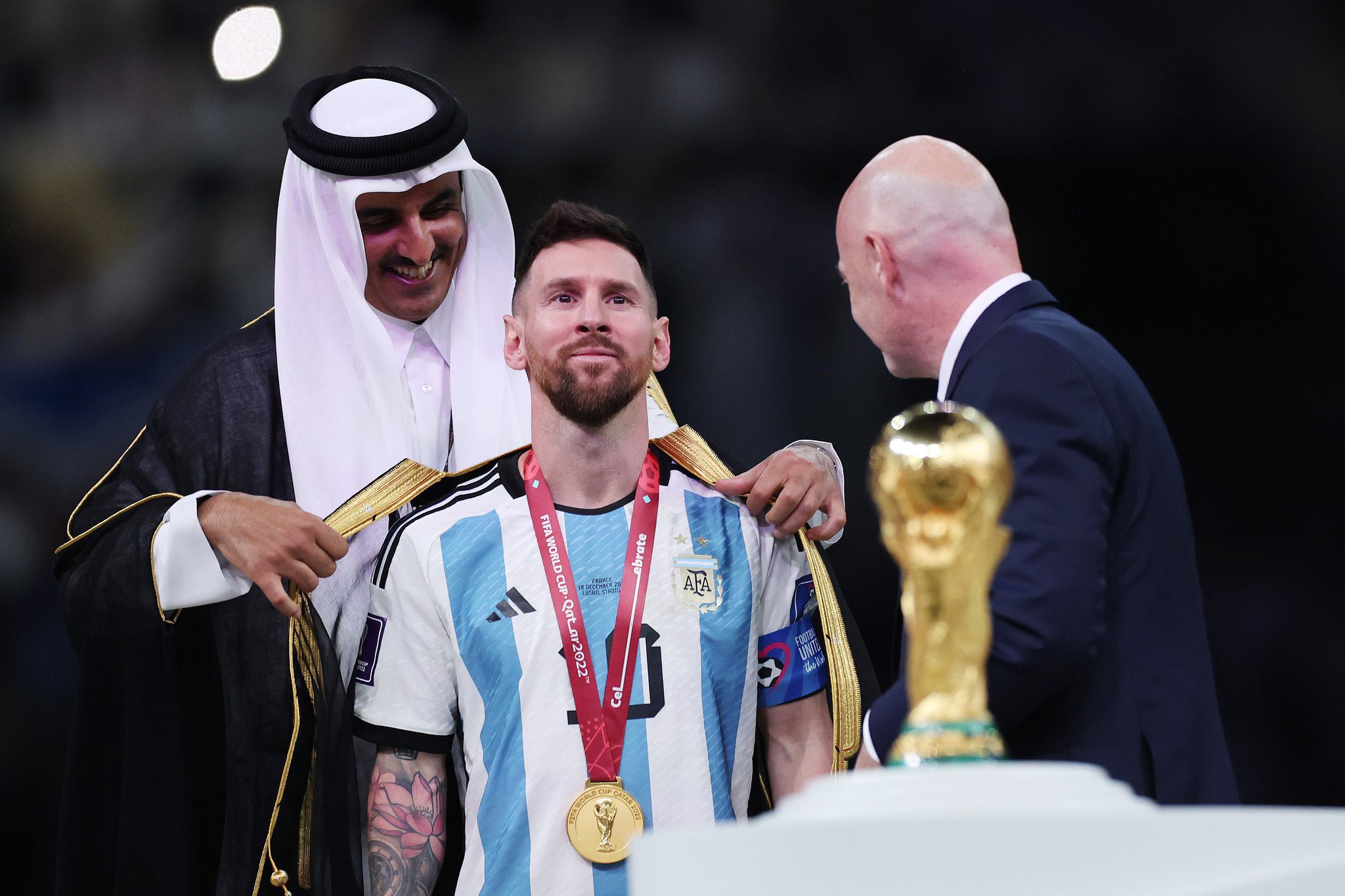Messi assisted his team in winning their first World Cup since 1986 by tallying two goals and contributing to his team’s penalty shootout to defeat France.
Argentina’s Lionel Messi was invited to the stage last night to accept the World Cup trophy, however the superstar’s donning of a black Arab cloak triggered racism from Western pundits and journalists.
Messi was draped in the cloak, locally known as bisht, by Qatar’s Amir Sheikh Tamim bin Hamad Al Thani. For the Arab hosts of the region’s first World Cup, the gifting of the bisht was a symbolic a part of Arab culture to honour guests.
The bisht is a traditional men’s cloak popular in the region, and is worn in special ceremonies.
The action received praise on social media in the region and beyond, however it also sparked a new wave of racism from western journalists and Twitter users.
BBC pundit Pablo Zabaleta asked “Just why? There’s no reason to do that.” While BBC host Gary Lineker said it was “a shame they’ve covered his shirt” during what was “a magic moment”.
Meanwhile, ESPN journalist Mark Ogden described its as a barber’s “cape” while HITC Sport’s Dylan Walsh compared the traditional clothing to a “Victoria Secret robe”. Both of those tweets have now been deleted and the journalists issued watered down criticism of the moment.
Explaining the iconic move, Hassan Al Thawadi, secretary general of Qatar’s tournament organising committee, told BBC Sport “it is a dress for an official occasion and worn for celebrations”.
“This was a celebration of Messi. The World Cup had the opportunity to showcase to the world our Arab and Muslim culture. This was not about Qatar, it was a regional celebration.
“People from different walks of life were able to come, experience what was happening here and get to understand that we may not see eye to eye on everything, but we can still celebrate together.”
Criticism marred by anti-Arab sentiment
A Twitter user said in response “Stop thinking that you’re the world and realize that you’re part of a world full of different races, religions cultures and traditions. When Arabs gift their guest a bisht it dignifies him and is a sign of gratitude and isn’t so different from when Pele wore a Mexican hat in 1970.”
“This is a clear example of how some of the Qatar 2022 criticism are just simply marinated in anti-arab sentiment. Messi is wearing an Arabic cultural clothing but Miguel cant stand it. He immediately associates it with regimes. It’s equivalent to wearing the Japanese Kimonos,” wrote one Twitter user in response to the Miguel Delaney, the Chief Football Writer at The Independent.
Amid the storm of anger and complaints, many social media users expressed the pride and joy they felt seeing the moment.
“Everyone is complaining about how Messi wore the Qatari Bisht. But he doesn’t seem bothered at all. LOOK AT THE CONFIDENCE. The truth is Europeans just can’t fathom the fact that an Arab country just hosted probably the best World Cup from the games to the organization,” one Twitter user said.
Another user said: “I’m probably in the minority here but I thought Lionel Messi wearing a bisht was a nice touch. Bishts are given to Arab warriors after a victory in battle or to royalty…Messi just won the greatest battle of them all and confirmed himself as the king of football.”
Responding to that tweet, one person said: “This is a fitting and respectful gesture for Messi. We could benefit from some nuance in our critique of Qatar and FIFA.”
“For those that don’t know — the black cloak that Messi is wearing is a Bisht—meaning ‘nobility’ or ‘dignity’. It has been worn in the Arab world for thousands of years. It is an honour, and marks him as the legend that he is!!” another tweet added.







